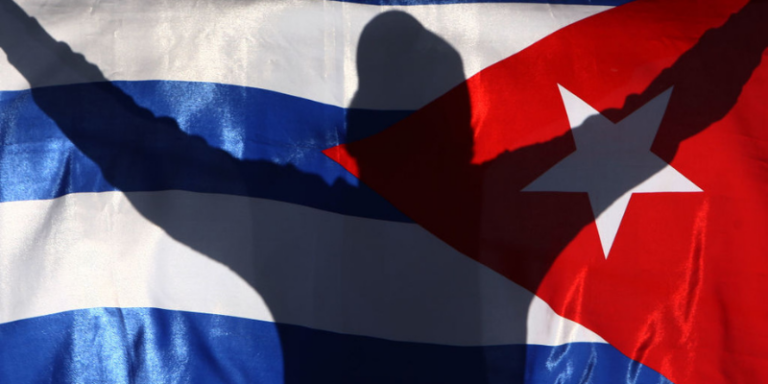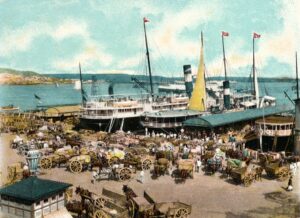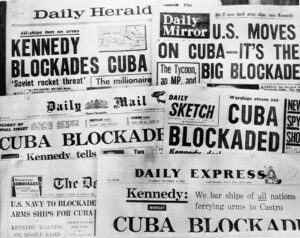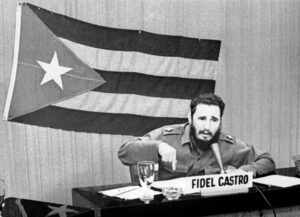A Look at the Unique History of Cuba
How a tiny island south of the U.S. became a hotspot for global strife.
By: Andrew Moran | July 22, 2021 | 711 Words

(Photo by Donald Miralle/Getty Images)
The history of Cuba has included many foreign actors. In 1492, Christopher Columbus became the first European to step foot in Cuba. He claimed the island for Spain, even though a native population already lived there, called the Taíno. Spain used the island for natural resources, like cotton, sugar, tobacco, and yucca plants. By 1526, slaves had been brought from Africa to work the fields.

Muelle de Luz harbour with ferries, Havana, Cuba, 1904. Artist: Unknown. (Photo by The Print Collector/Getty Images))
By 1762, many battles had taken place over who would rule the island. In 1868, Cubans rebelled against Spain. Some nations recognized Cuba as independent, but the United States disagreed. The dispute lasted a long time, but in 1898, Spain gave up control of Cuba. The U.S. took over for three years, but in 1902, Cuba was declared independent.
The 20th century was a time of political subterfuge, the rise of communism, and bad U.S.-Cuba relations. Here are some key events in the last century:
- After Cuba gains independence, the new President Gerardo Machado creates a dictatorship.
- Fulgencio Batista is elected president. He is supported by the U.S.
- Fidel Castro triggers a revolution against Batista and takes over the country.
- The Bay of Pigs Invasion and the Cuban Missile Crisis become big events in the Cold War.
- Relations between Cuba and the United States go downhill. The U.S. bans trade and travel to/from Cuba.
US-Cuba Relations
In 1959, Fidel Castro took over Cuba. He turned the country into a communist state and got support from the Soviet Union. It was the time of the Cold War between the U.S. and the Soviet Union, so Cuba became an important place in the conflict.

(Getty Images)
In the Bay of Pigs invasion, President John F. Kennedy sent more CIA-supported Cuban exiles to overthrow the Castro regime. The Cuban military stopped the coup d’état after only three days.
In October 1962, the U.S. military learned that Cuba had let the Soviet Union build nuclear missile bases on the island. This led to a two-week standoff after Kennedy demanded Russia remove the weapons. Finally, Soviet leader Nikita Khrushchev announced the removal of the missiles after Kennedy agreed not to invade Cuba. This became known as the Cuban Missile Crisis.
Since then, relations between Cuba and the United States have been mostly unfriendly.
Cuba’s Socialist Economy
What’s life like in Cuba? The island nation is sometimes called a time capsule of the 1950s because the communist society has not been able to develop or update over the years. Old car models and rundown buildings are often seen in photos of Cuba.

(Photo by Keystone-France/Gamma-Keystone via Getty Images)
The government controls how products are made and their prices. While the government allows people to own private property, it still says what can and cannot be done on these properties. This has led to a situation where the country is running out of food and medical supplies. It is often difficult to buy things as many products are in short supply. Most Cubans are poor, with a low standard of living.
The government also decides what people can say, and it persecutes people who criticize it.
While the island could be seen as a tropical paradise, Cuba struggles to participate in the modern world.
President Lyndon Baines Johnson opened America’s doors to Cuban refugees. Over the decades, more than a quarter of a million Cubans have fled the country and come to the United States.
Will Hope Come to Cuba?
The Castro Era is over, and the president of Cuba is now Miguel Diaz-Canel. The island is still a communist society – but will it stay that way for much longer?
July 2021 saw mass protests on the streets of Cuba, with thousands of people demanding freedom. Will they keep fighting for change?
Will this lead to a new revolution, or will the protesters fall to the communist regime? If the demonstrators get their freedom, will socialism be abandoned? For now, it is anybody’s guess what comes next. Until then, the world will be shouting, “Viva La Cuba!”
















